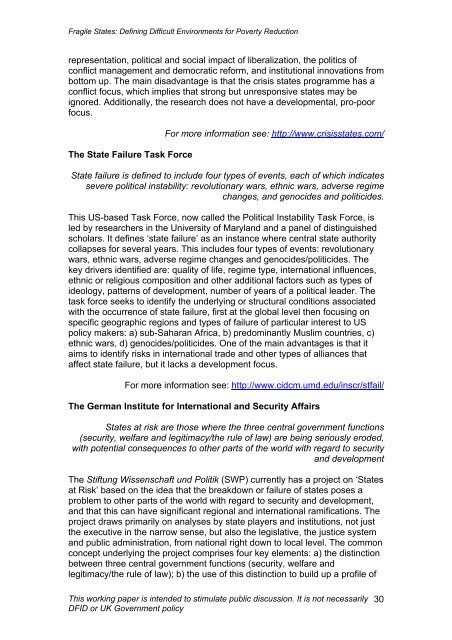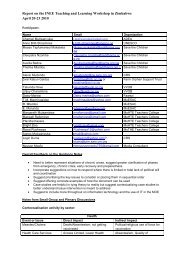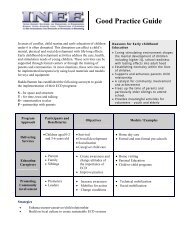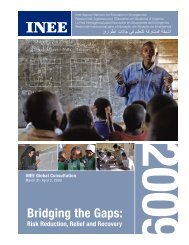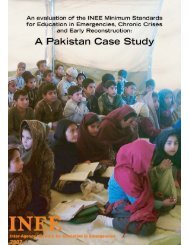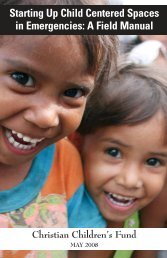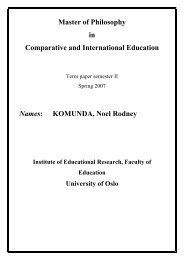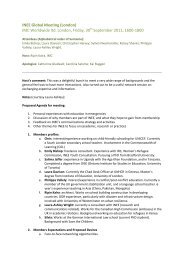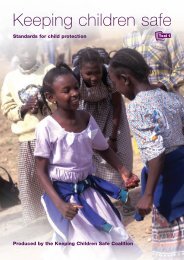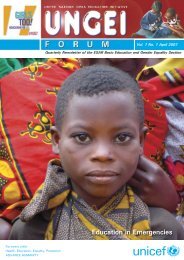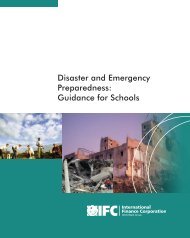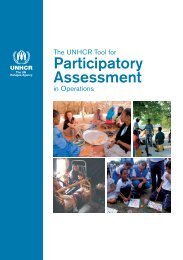Fragile States: Defining Difficult Environments for Poverty ... - INEE
Fragile States: Defining Difficult Environments for Poverty ... - INEE
Fragile States: Defining Difficult Environments for Poverty ... - INEE
You also want an ePaper? Increase the reach of your titles
YUMPU automatically turns print PDFs into web optimized ePapers that Google loves.
<strong>Fragile</strong> <strong>States</strong>: <strong>Defining</strong> <strong>Difficult</strong> <strong>Environments</strong> <strong>for</strong> <strong>Poverty</strong> Reductionrepresentation, political and social impact of liberalization, the politics ofconflict management and democratic re<strong>for</strong>m, and institutional innovations frombottom up. The main disadvantage is that the crisis states programme has aconflict focus, which implies that strong but unresponsive states may beignored. Additionally, the research does not have a developmental, pro-poorfocus.The State Failure Task ForceFor more in<strong>for</strong>mation see: http://www.crisisstates.com/State failure is defined to include four types of events, each of which indicatessevere political instability: revolutionary wars, ethnic wars, adverse regimechanges, and genocides and politicides.This US-based Task Force, now called the Political Instability Task Force, isled by researchers in the University of Maryland and a panel of distinguishedscholars. It defines ‘state failure’ as an instance where central state authoritycollapses <strong>for</strong> several years. This includes four types of events: revolutionarywars, ethnic wars, adverse regime changes and genocides/politicides. Thekey drivers identified are: quality of life, regime type, international influences,ethnic or religious composition and other additional factors such as types ofideology, patterns of development, number of years of a political leader. Thetask <strong>for</strong>ce seeks to identify the underlying or structural conditions associatedwith the occurrence of state failure, first at the global level then focusing onspecific geographic regions and types of failure of particular interest to USpolicy makers: a) sub-Saharan Africa, b) predominantly Muslim countries, c)ethnic wars, d) genocides/politicides. One of the main advantages is that itaims to identify risks in international trade and other types of alliances thataffect state failure, but it lacks a development focus.For more in<strong>for</strong>mation see: http://www.cidcm.umd.edu/inscr/stfail/The German Institute <strong>for</strong> International and Security Affairs<strong>States</strong> at risk are those where the three central government functions(security, welfare and legitimacy/the rule of law) are being seriously eroded,with potential consequences to other parts of the world with regard to securityand developmentThe Stiftung Wissenschaft und Politik (SWP) currently has a project on ‘<strong>States</strong>at Risk’ based on the idea that the breakdown or failure of states poses aproblem to other parts of the world with regard to security and development,and that this can have significant regional and international ramifications. Theproject draws primarily on analyses by state players and institutions, not justthe executive in the narrow sense, but also the legislative, the justice systemand public administration, from national right down to local level. The commonconcept underlying the project comprises four key elements: a) the distinctionbetween three central government functions (security, welfare andlegitimacy/the rule of law); b) the use of this distinction to build up a profile ofThis working paper is intended to stimulate public discussion. It is not necessarilyDFID or UK Government policy30


